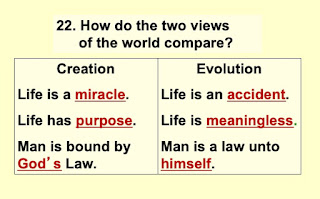The creation of God is very important to
us. In the Catechism we remember: “God
has made me and all creatures. He has given me my body and soul, eyes, ears and
all my members, my reason and all my senses and still preserves them. He also
gives me clothing and shoes, food and drink, house and home, wife and children,
land, animals and all I have. He richly and daily provides me with all that I
need to support this body and life...
In a number of places, as in Psalm 148,
the Bible says that the creation itself praises the Creator. The creation is
the handiwork of God and shows us His wisdom and power (Psalm 19). Jesus showed a great appreciation for nature.
Many of His teachings were given in the lecture halls of grass, sea, hills, and
sky. He prayed in the fields and in the gardens.
But people have always been tempted to
fall in love with the creation and to look upon it as god. Paul warned about
this problem in the first chapter of his letter to the Romans when he said
there are those who “exchanged the truth of God for the lie, and worshiped and
served the creature rather than the Creator, who is blessed forever. Amen”
(Romans 1.25). Moses warned to “take heed, lest you lift your eyes to heaven,
and when you see the sun, the moon, and the stars, all the host of heaven, you
feel driven to worship them and serve them, which the Lord your God has given
to all the peoples under the whole heaven as a heritage” (Deuteronomy
4.19).
On June 5th the church remembered St.
Boniface, who was the first missionary to the Germanic people. They worshiped
nature gods such as Woden (from which we still get the name “Wednesday”) and
Donar (the German version of Thor). These gods were worshiped with sacred trees
and sacrifices of both animals and humans. One of the most significant acts of
Boniface was to chop down the sacred Oak of Donar. When the god did not strike
him down, the people were amazed and converted to Christianity. Since then many barbarians who worshiped
nature gods were converted to Christianity.*

However, today many people are reverting. First they turn away from the belief that God
is the Creator of the universe to the idea that the universe created itself. Then
they conclude that the universe, the creation itself, is god. (This was the view of the philosopher
Spinoza.) The tragedy of this is that the universe, as beautiful as it may be
in many respects, gives us no moral guidance or forgiveness of sins for that
matter. Nature may be beautiful one minute, but it can be “red in tooth and
claw” the next (In Memoriam, Alfred
Lord Tennyson). Richard Dawkins uses this phrase in his book The Selfish Gene as he explains that
selfishness is simply the reality of life. Selfishness is the only law that
that the nature god teaches just as St. Paul warned.
It is important that we worship the
Creator rather than the creation. This is because the creation is flawed,
broken, and fallen. To worship the creation is to worship death and
destruction, meaninglessness and emptiness. But the God who created all things
to be very good is also the God who can renew the goodness of creation. He sent
His Son into this world to remove sin and all its effects. This is why the Apostle Paul also said in
Romans chapter eight that “… the creation itself also will be delivered from
the bondage of corruption into the glorious liberty of the children of God”
(8.21). So, just as we are forgiven of
our sins by the sacrifice of Jesus on the cross, so, in God’s greater plan of
salvation, the creation will also be delivered from its present corruption.
So, the best thing anyone can do for this
creation is to confess our sins to the Creator and believe in the Savior. With sin thus removed and restrained we can acknowledge
the Creator and serve Him in His creation. Amen.
*However he did
not fare as well with the Frisian Tribe. After baptizing
a great number of them he and fifty-two of his companions were killed. The
ancient Ragyndrudis Codex was found at the spot and contains incisions that
could have been made with a sword or axe.






